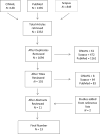Integrative Review of Interventions to Promote Breastfeeding in the Late Preterm Infant
- PMID: 28390223
- PMCID: PMC5569319
- DOI: 10.1016/j.jogn.2017.01.006
Integrative Review of Interventions to Promote Breastfeeding in the Late Preterm Infant
Abstract
Objective: To define the different breastfeeding interventions that promote breastfeeding exclusivity and duration in the late preterm infant and to synthesize findings from the published empirical literature on late preterm infant breastfeeding interventions.
Data sources: The databases CINAHL, Scopus, and PubMed were searched for primary research articles on breastfeeding interventions for late preterm infants. Inclusion criteria included original research studies in which authors examined a breastfeeding intervention or second-line strategy in a sample inclusive of but not necessarily limited to the gestational age range of 34 to 3667 weeks gestation, written in English, and published between 2005 and 2015.
Study selection: Thirteen articles were identified, including five randomized controlled trials, three quasi-experimental studies, four descriptive studies, and one case study.
Data extraction: Whittemore and Knafl's methodology guided this integrative review. Data extraction and organization occurred under the following headings: author and year, study design, level of evidence, purpose, sample, setting, results, limitations, recommendations, and intervention.
Data synthesis: Studies on breastfeeding interventions were synthesized under four concepts within the Late Preterm Conceptual Framework: Physiologic Functional Status, Care Practices, Family Role, and Care Environment.
Conclusion: Most breastfeeding interventions within this integrative review had positive effects on exclusivity and duration of breastfeeding in the late preterm infant. However, second-line strategies had equivocal effects on exclusivity but had positive effects on duration. The positive effects of breastfeeding interventions on breastfeeding exclusivity and duration are highlighted in our results, and we point to the need for a focus on breastfeeding after the transition home for late preterm infants.
Keywords: breastfeeding intervention; integrative review; late preterm infant.
Copyright © 2017 AWHONN, the Association of Women’s Health, Obstetric and Neonatal Nurses. Published by Elsevier Inc. All rights reserved.
Conflict of interest statement
Disclosure
The authors report no conflict of interest or relevant financial relationships.
Figures


References
-
- Association of Women’s Health, Obstetric and Neonatal Nurses. Assessment and care of the late preterm infant: Evidence-based clinical practice guidelines. Washington, DC: Author; 2010.
-
- Association of Women’s Health, Obstetric and Neonatal Nurses. Assessment & care—late preterm infant implementation toolkit. Washington, DC: Author; 2013.
Publication types
MeSH terms
Grants and funding
LinkOut - more resources
Full Text Sources
Other Literature Sources
Medical

